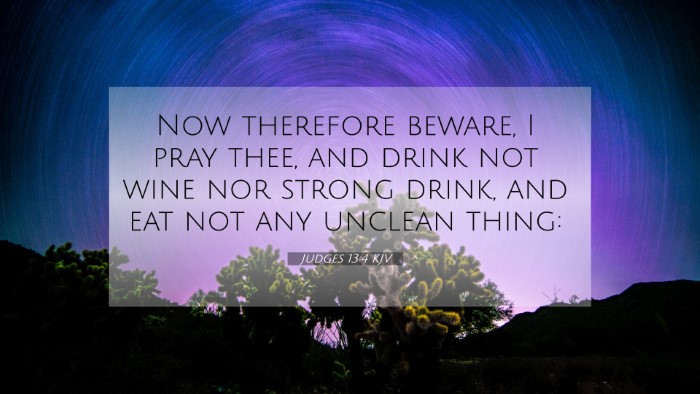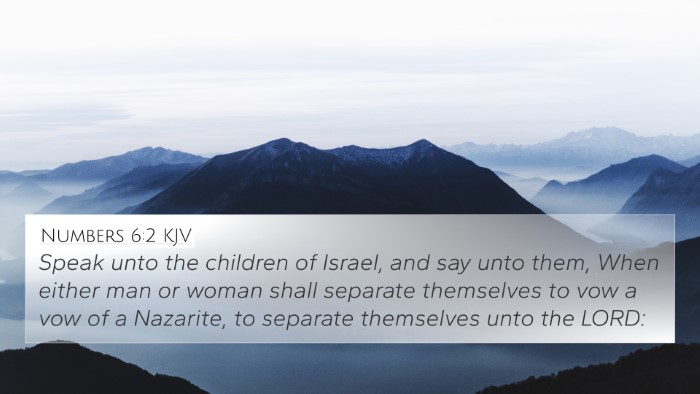Bible Verse Meaning: Judges 13:4
Verse: Judges 13:4 - "Now therefore be careful not to drink wine or strong drink, and not to eat any unclean thing."
Overview
This verse comes from the narrative surrounding the birth of Samson, one of the Judges of Israel. It is part of an announcement made by an angel to Manoah and his wife regarding specific instructions on how to raise Samson, who was to be a Nazirite dedicated to God from birth.
Commentary Insights
Combining insights from public domain commentaries, we can explore the rich meanings behind Judges 13:4.
Matthew Henry's Commentary
Matthew Henry highlights the necessity of separation and holiness in the life of someone destined for a unique purpose. The Nazirite vow, which includes abstaining from wine and unclean food, signifies a life set apart for God's service. This command emphasizes the seriousness of the divine calling placed upon Samson, where external actions reflect internal devotion.
Albert Barnes' Notes
Albert Barnes elaborates on the health aspects and symbolic meanings behind the dietary restrictions. By avoiding wine and unclean foods, Samson's parents were encouraged to maintain purity. This not only related to physical health but also spiritual health, underscoring that their parenting was instrumental in shaping a child destined for greatness.
Adam Clarke's Commentary
Adam Clarke focuses on the implications of the Nazirite vow, explaining that it signifies a life wholly dedicated to God. This lifestyle also reflects the expectations placed upon God's servants, where abstaining from worldly pleasures allows individuals to draw closer to their divine mission. Clarke emphasizes that such separations from societal norms prepare individuals for greater service in God’s plan.
Cross-References
- Numbers 6:3-4: Details the Nazirite vow, including abstaining from wine and unclean foods.
- Ephesians 5:18: Encourages believers not to be drunk with wine but to be filled with the Spirit.
- 1 Peter 2:9: Calls believers a chosen generation, emphasizing a life set apart for God's purposes.
- Romans 12:1-2: Urges believers to present their bodies as living sacrifices, highlighting holiness.
- Hebrews 12:14: Instructs followers to pursue peace and holiness, showing the call to a sanctified life.
- 1 Corinthians 9:24-27: Paul speaks about self-control, likening life to a race requiring discipline.
- Joshua 1:8: Encourages meditation on God's Word for success, linking biblical obedience to fruitful living.
Thematic Connections
This verse encapsulates a theme of divine instruction and the importance of setting oneself apart for God's purpose. Throughout the Bible, God consistently calls His people to holiness and separation from worldly practices. This resonates in several other passages that underscore the value of purity and dedication.
Comparative Insights
Connecting Judges 13:4 with other scriptures reveals a consistent pattern of God's expectations regarding separation. The mention of unclean things resonates with the dietary laws outlined in the Old Testament, where God equips His people with guidelines meant for their spiritual and physical well-being.
Application for Today's Believers
The instructions given to Manoah and his wife serve as a reminder for the modern believer to consider the implications of their lifestyle choices. As followers of Christ, there is a call to a sanctified life, which often requires abstaining from certain societal norms for the sake of a higher purpose. Believers are encouraged to reflect on how their choices align with their commitment to God.
Reflection Questions
- How can I live a lifestyle that is set apart for God today?
- What areas of my life require a deeper commitment to holiness?
- In what ways can the concept of the Nazirite vow inspire my daily faith walk?
Conclusion
Judges 13:4 serves as a foundational scripture that connects to numerous themes of holiness, separation, and divine calling. By understanding the context and implications of this verse, believers can deepen their faith and commitment to living according to God's standards. Cross-referencing this verse with others illuminates the continuity in God's call for righteousness among His people across both the Old and New Testaments.









